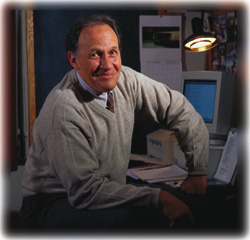![]()
Main Menu · Search · Current Issue · Contact · Archives · Centennial · Letters to the Editor · FAQs
![]()
Main Menu · Search · Current Issue · Contact · Archives · Centennial · Letters to the Editor · FAQs
 |
Is the economic crisis in East Asia a mere blip on the screen? Yes, says Jeffrey Williamson, an observer with a perspective longer than the trading day. (This is not to deny the pain of the blip to those closest to it.) The Bell professor of economics and chairman of the department, he studies growth and development, especially in Third World countries, through the prism of economic history. He argues, for example, that "much of the variety in growth performance over the past half century has been driven by demographic forces." High fertility and mortality rates fall to create a modern society in which people have fewer children, who live a long time. Mortality rates decline first, and so the society has a big bulge in the number of its young people. Think of a boa constrictor who swallows a pig, the professor advises. Watch that bulge move through the boa, having its economic effects. What matters for growth is the age distribution of the population, he says, not the inevitable financial blip. An amiable, trust-inspiring man, Williamson takes warm interest in the lives of his and his wife Nancy's four children and four grandchildren, in a summer cottage on a lake in Maine, and in the Red Sox (despite management, which, since Ruth, has treated players badly). Williamson has twice won the Galbraith Prize for the best teacher in the graduate economics program. When he was master of Mather House, from 1986 through 1993--"an exhausting but fabulous time in my life"--he delighted in getting to know his charges and sometimes thought he did more teaching in that role than at Littauer discoursing on economics.
Main Menu · Search · Current Issue · Contact · Archives · Centennial · Letters to the Editor · FAQs
![]()